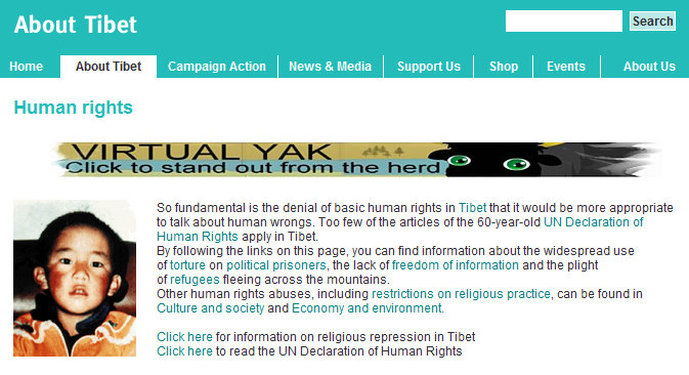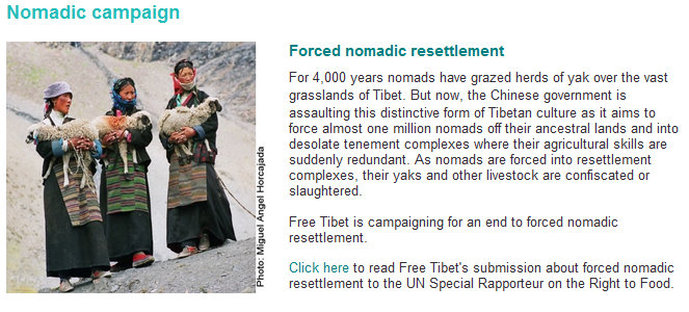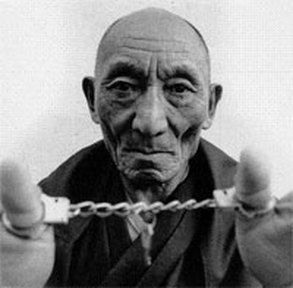Stay current with information on urgent campaigns for 2011
Older, but relevant news:
It's September 1, 2010. Here's a letter I just received that I wanted to share with my readers.
Dear Betsy,
Starting today through September 5th, the Chinese government is featuring "Tibet Week" at the Shanghai World Expo in an attempt to claim Tibetan culture as its own and whitewash its abysmal human rights record in Tibet.
The theme of "Tibet Week" is "Heaven in Tibet." Nothing could be further from the truth in Chinese-occupied Tibet.
While the Chinese government parades state-sponsored Tibetan culture on the stage in Shanghai, scores of Tibetan artists, writers, musicians, bloggers, and other public figures have been arrested, imprisoned, harassed, or disappeared for speaking out about the aspirations, the hardships, and the deepening pride and unity of Tibetans living under Chinese occupation.
TAKE ACTION: Stop the Attack on Tibet's Culture
http://sft.convio.net/site/R?i=8vLn_pDt01SMnLpVoTqszA..
1. Support Cultural Resistance in Tibet: Watch and share new videos from inside Tibet expressing Tibetan unity, pride, and a collective vision for the future at http://sft.convio.net/site/R?i=YrxkdFB_PHMjOgeI7yRbgQ.. (videos courtesy of High Peaks Pure Earth: http://sft.convio.net/site/R?i=fqqxn6TN0V1Wn_UztXY31A..
SFT is featuring the explosion of "I am Tibetan" videos and poems in Episode 03 of the Renaissance Series. "I am Tibetan": Voices from Occupied Tibet will be held today, September 1st, in front of the Chinese Consulate in New York City: http://sft.convio.net/site/R?i=oidzxREunnf0rEog7ZYj0g..
2. Call for the Release of Tibetan Writers, Artists, and Musicians: The Chinese government is targeting Tibetan cultural figures in an attempt to silence them. But with your help, we can amplify their voices and effectively campaign for their release.
Sign a petition for detained Tibetan scholar Shogdung: http://sft.convio.net/site/R?i=D0ElA7QzhowoZ3bNx7E0yA..
Read & share the New York Times profile of Shogdung's arrest and his literary work:http://sft.convio.net/site/R?i=0pNVIDuOJYBrp-HQ7UXc6Q..
Sign a petition for Tashi Dhondup, a musician jailed for his revolutionary lyrics: http://sft.convio.net/site/R?i=ZfEQ-VJSZEin5hc7ps-gqg..
Sign a petition for jailed Tibetan filmmaker, Dhondup Wangchen: http://sft.convio.net/site/R?i=wVv9e9NcR6aDUsZ0COWJDg..
3. Change your Facebook profile picture and other social networking avatars. Express your pride in being Tibetan and/or support for the Tibetan people: http://sft.convio.net/site/R?i=bzUgmJSxIdXdm4uyl0zSAg..
Find more and read about the significance of these Tibet-themed avatars on High Peaks Pure Earth: http://sft.convio.net/site/R?i=iJL3Vfg0REztejDdEx-6XQ..
4. Text a message of support to Tibetan artists and cultural figures: Use the hashtag #ihearttibet and we'll translate selected tweets into Tibetan and Chinese so they are more accessible to Tibetans inside Tibet and China.
In spite of China's repression, the resistance movement in Tibet is gaining momentum. Tibetans, especially the younger generation, are rising up and declaring their pride in being Tibetan, and challenging China's apparatus of control in Tibet in new and creative ways. Read about how Tibetan netizens are using cyberspace to empower themselves, connect with each other, and promote the movement: http://sft.convio.net/site/R?i=7bPIdt1r40oPO91CqlsJ6w..
5) Spread the Word: If you live near a Chinese consulate or embassy, hand out flyers to
people entering/leaving the visa office and urge people visiting the Shanghai Expo to boycott
the "Heavenly Tibet" pavilion. Email
We always like to hear from you, so please let us know what you or your chapter is doing to expose China's Tibet propaganda at the Shanghai Expo. Send an update to
Thank you for all that you do for Tibet,
Tendor, Kate, Tendolkar, Stefanie, Mary-Kate and all of us here at SFT HQ
Straight from STUDENTS FOR A FREE TIBET:
Take Action to Free filmmaker Dhondup Wangchen! US President Obama is scheduled to travel to China soon. Send an email asking him to raise Dhondup Wangchen's case with Chinese leaders.
Dhondup Wangchen, the Tibetan filmmaker who made the remarkable film, Leaving Fear Behind, has been detained and charged with "inciting separatism," and his trial could take place at any time. His story is below... it deserves to be read. He deserves to be freed.
[click image below to read about Dhondup Wangchen, being held in a Chinese prison...]
Take Action to Free filmmaker Dhondup Wangchen! US President Obama is scheduled to travel to China soon. Send an email asking him to raise Dhondup Wangchen's case with Chinese leaders.
Dhondup Wangchen, the Tibetan filmmaker who made the remarkable film, Leaving Fear Behind, has been detained and charged with "inciting separatism," and his trial could take place at any time. His story is below... it deserves to be read. He deserves to be freed.
[click image below to read about Dhondup Wangchen, being held in a Chinese prison...]
Straight from the newsroom of STUDENTS FOR A FREE TIBET:
CHONGQING, China — A self-taught filmmaker who spent five months interviewing Tibetans about their hopes and frustrations living under Chinese rule is facing charges of state subversion after the footage was smuggled abroad and distributed on the Internet and at film festivals around the world.
The filmmaker, Dhondup Wangchen, who has been detained since March 2008, just weeks after deadly rioting broke out in Tibet, managed to sneak a letter out of jail last month saying that his trial had begun.
Until now, the case of Mr. Wangchen, 35, has received little attention abroad. Uneducated and plainspoken, he was an itinerant businessman until October 2007, when he bought a small video camera and began traveling the Tibetan plateau interviewing monks, yak herders and students about their lives.
Tsetring Gyaljong, a cousin who helped him make the documentary, said that Mr. Wangchen’s political awareness was sharpened nearly a decade ago, when he witnessed a demonstration in Lhasa, the Tibetan capital, that was quickly broken up by public security officers.
“He saw how it was dissolved in two or three minutes and how everyone was taken away,” said Mr. Gyaljong, speaking from Switzerland, where he has lived in exile since escaping from Tibet. “There were no pictures, no testimonies, and he felt like the world should know that Tibetans, despite the Chinese portrayals, are not a happy people.”
Out of 40 hours of footage and 108 interviews came “Leaving Fear Behind,” a 25-minute documentary that is an unadorned indictment of the Chinese government. Although given the choice to conceal their identities, most of his subjects spoke uncloaked and freely expressed their disdain for the Han Chinese migrants who are flooding the region and their love for the Dalai Lama, who has lived in exile since 1959.
In his own comments at the start of the film, Mr. Wangchen said the approach of the 2008 Olympics had compelled him to record the feelings of Tibetans, many of whom were less than enthusiastic about the decision to hold the Games in Beijing.
“We have no independence or freedom, so Tibetans have no reason to celebrate,” said one young woman standing by a road. “The Chinese have independence and freedom, so this is something they can celebrate.”
On March 10, 2008, Mr. Wangchen traveled to Xi’an in central China to hand over the tapes to Dechen Pemba, a British citizen who ferried them out of the country. That same day, a protest in Lhasa turned into a rampage that left at least 18 people dead, most of them Han Chinese.
On March 26, Mr. Wangchen and Golog Jigme, a Buddhist monk who helped him make the film, were arrested. Mr. Jigme was subsequently released.
“It really is a remarkable coincidence,” Ms. Pemba said.
Mr. Wangchen’s family hired a lawyer, but the authorities barred him from court last July, leaving Mr. Wangchen with a public defender.
Before he was forced to drop the case, the lawyer, Li Dunyong, said Mr. Wangchen had told him that he was tortured and that he had contracted hepatitis B while in custody. Since then, he has been held incommunicado. Officials at the Xining Intermediate Court in Qinghai Province, where Mr. Wangchen is being held, would not comment on his case.
Mr. Wangchen seemed acutely aware that his project could get him in trouble. Just before he began filming, he sent his wife and their four children to India, where they live along with his elderly parents.
In an interview from Dharamsala, where she works as a baker, Mr. Wangchen’s wife, Lhamo Tso, said she feared she might not see him again for many, many years.
“As a wife, I’m very sad to be without the person I love so much,” she said. “But if I can separate out that sadness, I feel proud because he made a courageous decision to give a voice to people who don’t have one.”READ FULL STORY..
Dhondup Wangchen embarked on a journey to record Tibetans view and here he explains purpose for this mission.
CHONGQING, China — A self-taught filmmaker who spent five months interviewing Tibetans about their hopes and frustrations living under Chinese rule is facing charges of state subversion after the footage was smuggled abroad and distributed on the Internet and at film festivals around the world.
The filmmaker, Dhondup Wangchen, who has been detained since March 2008, just weeks after deadly rioting broke out in Tibet, managed to sneak a letter out of jail last month saying that his trial had begun.
Until now, the case of Mr. Wangchen, 35, has received little attention abroad. Uneducated and plainspoken, he was an itinerant businessman until October 2007, when he bought a small video camera and began traveling the Tibetan plateau interviewing monks, yak herders and students about their lives.
Tsetring Gyaljong, a cousin who helped him make the documentary, said that Mr. Wangchen’s political awareness was sharpened nearly a decade ago, when he witnessed a demonstration in Lhasa, the Tibetan capital, that was quickly broken up by public security officers.
“He saw how it was dissolved in two or three minutes and how everyone was taken away,” said Mr. Gyaljong, speaking from Switzerland, where he has lived in exile since escaping from Tibet. “There were no pictures, no testimonies, and he felt like the world should know that Tibetans, despite the Chinese portrayals, are not a happy people.”
Out of 40 hours of footage and 108 interviews came “Leaving Fear Behind,” a 25-minute documentary that is an unadorned indictment of the Chinese government. Although given the choice to conceal their identities, most of his subjects spoke uncloaked and freely expressed their disdain for the Han Chinese migrants who are flooding the region and their love for the Dalai Lama, who has lived in exile since 1959.
In his own comments at the start of the film, Mr. Wangchen said the approach of the 2008 Olympics had compelled him to record the feelings of Tibetans, many of whom were less than enthusiastic about the decision to hold the Games in Beijing.
“We have no independence or freedom, so Tibetans have no reason to celebrate,” said one young woman standing by a road. “The Chinese have independence and freedom, so this is something they can celebrate.”
On March 10, 2008, Mr. Wangchen traveled to Xi’an in central China to hand over the tapes to Dechen Pemba, a British citizen who ferried them out of the country. That same day, a protest in Lhasa turned into a rampage that left at least 18 people dead, most of them Han Chinese.
On March 26, Mr. Wangchen and Golog Jigme, a Buddhist monk who helped him make the film, were arrested. Mr. Jigme was subsequently released.
“It really is a remarkable coincidence,” Ms. Pemba said.
Mr. Wangchen’s family hired a lawyer, but the authorities barred him from court last July, leaving Mr. Wangchen with a public defender.
Before he was forced to drop the case, the lawyer, Li Dunyong, said Mr. Wangchen had told him that he was tortured and that he had contracted hepatitis B while in custody. Since then, he has been held incommunicado. Officials at the Xining Intermediate Court in Qinghai Province, where Mr. Wangchen is being held, would not comment on his case.
Mr. Wangchen seemed acutely aware that his project could get him in trouble. Just before he began filming, he sent his wife and their four children to India, where they live along with his elderly parents.
In an interview from Dharamsala, where she works as a baker, Mr. Wangchen’s wife, Lhamo Tso, said she feared she might not see him again for many, many years.
“As a wife, I’m very sad to be without the person I love so much,” she said. “But if I can separate out that sadness, I feel proud because he made a courageous decision to give a voice to people who don’t have one.”READ FULL STORY..
Dhondup Wangchen embarked on a journey to record Tibetans view and here he explains purpose for this mission.
TAKE ACTION TO DEMAND HIS RELEASE




